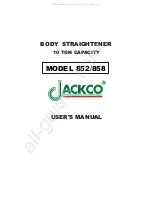INSTRUCCIONES PARA EL MONTAJE Y/O ELABORACIÓN DE LA TUERCA DE FIJACIÓN
DE LA HÉLICE Fig. 9. - INSTRUCTIONS FOR THE PROPER WORKING OF THE BLOCKING
NUT OF THE PROPELLER Fig. 9.
a) Cuando la tuerca está apretada sobre el eje del motor, debe apoyarse sobre las tres superficies S1, S2, S3.
Por tanto cuando se instala o elabora la tuerca cabe prestar atención a que la longitud L1 y L2 y que la
longitud la L3 sea mayor que el fileteado del eje. Para verificar la correcta ejecución del trabajo será
suficiente con darle un tinte (azul de Prusia) a la hélice y al eje en las tres partes y apretarla para
posteriormente desmontar y comprobar que los puntos de apoyo son los correctos.
When it’s locked on the motor shaft, the nut must contact the 3 surfaces S1,S2,S3. Therefore, when you
work the nut you must be sure that length L1 and L2 coincide precisely with the corresponding lengths
of prop hub, and that length L3 is greater than the length of the threaded edge of motor shaft. To
check that the work is done properly, you just have to spread a very thin coat of Prussian blue on the 3
surfaces S1,S2,S3. Insert then the nut in its seat in the hub and let the nut rotate softly in relation to the
hub, with a light pressure. When this is done, the 3 surfaces of the hub must be painted in blue.
b) Cuando se monta la hélice sobre el eje cabe verificar que el final del eje no toque el final de la tuerca de
esta forma evitaremos que el giro de las palas sea duro. En el caso que el movimiento de rotación de las
palas sea duro será necesario rebajar la superficie S1 con una lima plana o un ligero esmerilado.
When fitting the prop on the motor shaft, it’s necessary to check that the threaded part of the motor
shaft doesn’t touch the threaded end of nut. Also, when the nut is tight, the blades rotation on their
axis does not get hard. In case the blades rotation movement becomes hard, you have to remove from
surface S1 a very small amount of material. This operation can be done simply by using a flat smooth
file.
Fig. 9

















